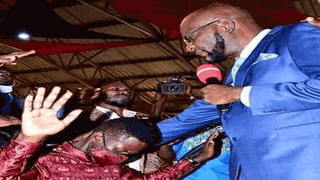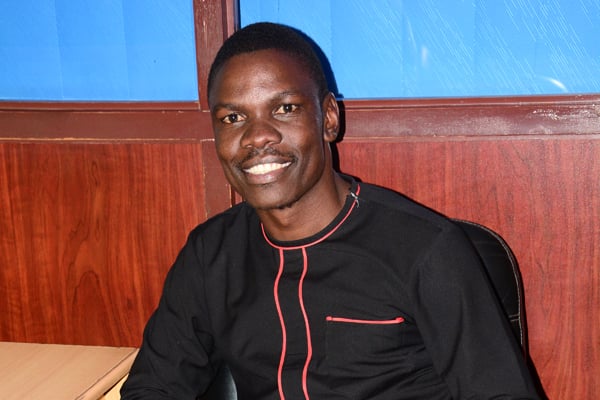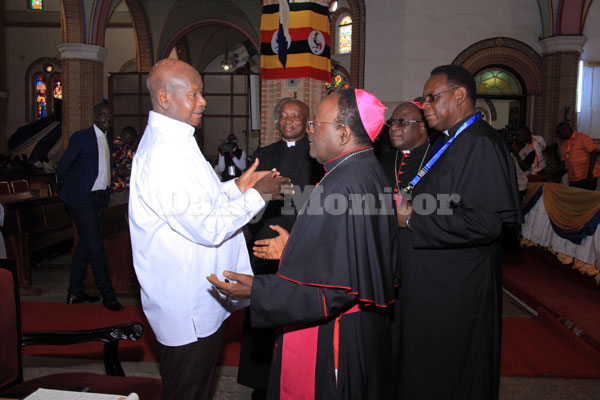
Pr Michael Kyazze of Omega Healing Ministries in Namasuba on Entebbe Road prays for then presidential candidate Robert Kyagulanyi, alias Bobi Wine, in January last year. PHOTO/ DERRICK WANDERA
|Special Reports
Prime
Pentecostals speak in party politics tongues
What you need to know:
- Monitor understands that leadership of National Fellowship for Born-Again Pentecostal Churches of Uganda has become a nest of intrigue.
Eleven days to the 2021 presidential poll, Mr Robert Kyagulanyi, alias Bobi Wine, returned to Kampala disenchanted, having been stopped from electioneering by state functionaries.
His entire campaign team had been incarcerated, some of his close friends and supporters killed.
Upon his return to Kampala, as he contemplated a lonely walk to the polling station on January 14, he sought solace in God. Mr Kyagulanyi went to Omega Healing Ministries in Namasuba on Entebbe Road on one Sunday. Pr Michael Kyazze heads the church.
“Jesus, please surround him because he has not done anything bad to anyone. All his friends have been arrested and others killed,” Pr Kyazze prayed over Mr Kyagulanyi that day. “May God take you to January 14 with strength and we ask God to give you to us as our new president.”
Mr Kyazze’s church subscribes to the National Fellowship for Born-Again Pentecostal Churches of Uganda (NFBPC)—a consortium of nearly 30,000 registered churches across the country.
Next week, the consortium—which apparently has been split along political party lines—goes to the polls. The split is essentially pitting the ruling National Resistance Movement (NRM) against the National Unity Platform (NUP).
Sunday Monitor understands that leadership of the consortium has been a nest of intrigue. The electioneering has been monetised to an extent that has never been seen in the Pentecostal body’s 32-year history.
The Pentecostal church contributes 11.1 percent of the Ugandan population. While this is some way off the Catholic Church (39.3 percent) and the Anglican Church (32 percent), the faith is arguably the fastest growing in the country.
During the 2021 General Election, the Church—especially the Catholics and the Pentecostals—found itself taking a central role in the political jostle. Now, a little over a year later, the election of NFBPC’s top brass finds itself having a political flavour. While NUP has been swayed by Mr Kyazze, NRM has pivoted toward Bishop Joshua Lwere.
“He is our man and we are friends because he stands with the people just as the other clerics who we have been friends with. The State will try to pull some away from us but we know the whole Church stands for the people and that is what we value most,” Mr Alex Waiswa Mufumbiro, the NUP party deputy spokesperson, says of Mr Kyazze.
Politicised
In the wake of the Covid-19 pandemic in 2020, born-again pastors received money from President Museveni. The pastors were led by Bishop Lwere—who is the general overseer of NFBPC. This is an apex position of the umbrella body of more than 600,000 members.
Mr Lwere would later be appointed as the chairperson of the Zero Tolerance to Corruption under the Anti-Corruption Unit in State House charged with fighting corruption across the country.
It is upon that background that the members of the fellowship are divided into political parties where the leaders are accusing each other of getting support from either side to finance the up-coming elections, which are due in one week.
Members of the fellowship say Mr Lwere, who is an interested party in the election, has taken sides and is out to sabotage members who are against his position from the party aspects.
The NFBPC constitution establishes elections of general overseer through a vote at the general assembly, which has to be attended by more than 300 members as representation from sub-county, district, province, region and national levels.
The constitution, as amended in 2016, also stipulates that the general overseers shall hold office for five years after which elections shall be held by members at the general assembly.
Upon conception 32 years ago, Prof Simeon Kayiwa became the overseer between 1990 and 1995. He was later re-elected in the same position for another five years. In 2003, Apostle Alex Mitala assumed office as the second supremo of the organisation—a position he also held for 10 years before Lwere took over in 2013.
When the general assembly sits tomorrow ahead of next week’s election, top of the discussion will be the proposed constitutional amendment. Among the proposals will be to disband the constitutional review commission (CRC), the electoral commission (EC), and the voting methods, among other issues.
Contenders
Five aspirants for the position of the general overseer include Leodard Sserwadda, who serves on the National Governing Committee from Masaka region; Moses Odongo, the current national clerk, Joseph Nsubuga, the national mobiliser, Fredrick Ssemazzi, the former secretary general and Micheal Kyazze.
According to sources who asked not to be named to be able to speak freely, one of the amendments that is feared will be smuggled into the annual general meeting is the lifting of the term limit of the leader.
Article (5, b, iii) of NFBPC constitution states: “After two consecutive terms, the General Overseer may only be eligible for re-election if a period equal or more than the total length that he spent in office has elapsed.”
Doubts abound
However, a section of the fellowship has questioned the motive of the AGM in the middle of an electoral process and demanded explanation for the proposed constitutional amendments at this time, a matter they have referred to as “fishy.”
Insiders believe, fearing to lose the eye of State House and other government top officials where he has been allegedly getting brown envelopes as a leader of the Pentecostal churches in Uganda, Lwere is without shame and fear of God, set to abrogate the NFBPC constitution and make himself life leader as general overseer.
During our investigations for this story, this reporter met with Bishop Lwere, who is being accused of using state machinery and resources to wield power, including dictating on when the constitution should be changed and stopping an electoral process midway to make change.
When Sunday Monitor visited his church on Sir Apollo Kagwa Road in Kampala last Friday, Lwere was engrossed in a meeting with some of the leaders meant to attend AGM.
“We have deemed it fit to amend the constitution because most of these provisions have been smuggled into the constitution and the CRC has so many powers so we want to take them,” Lwere told us once he had cleared his diary.
Lwere, Kyazze speak out
On the question of party politics polarising church elections, Lwere said: “We know some Opposition members have visited certain churches and they are financing them, which is why they are moving around the country campaigning, which is not allowed.”
Sunday Monitor understands that Kyazze has moved across the country on a consultation mission. Lwere moved to stop the move.
“I am only following the law and I broke no law. We know that some people are using state power to run over everyone,” Kyazze told Sunday Monitor.
Article 22 (4) (b) of the NFBPC constitution states: “The names of the candidates for the office of the General Overseer shall be forwarded by a minimum of 40 percent of the District Governing Council (s) from among the National Electoral College, (with national reflection) to the Electoral Commission, which in turn shall forward them to the National Council of Elders for vetting.”
ALSO READ: Such sound cooperation of church and state
Martin Wamala, the general secretary to the fellowship, says these are some of the clauses that were smuggled into the constitution and the AGM will agree whether to maintain them or throw them out.
“We only stopped the campaigns where people were splashing money to the people from I don’t know where,” Wamala said, adding, “We are doing this to keep the church together because we are seeing NUP, NRM and that will disintegrate us.”
Third term for Lwere?
Unlike his predecessors, Prof Kayiwa and Apostle Mitala, who left upon expiry of their two terms, Lwere isn’t planning on leaving office, a source told Sunday Monitor.
“He wants to have the constitution amended and to influence a clique of a few people,” our source revealed.
Lwere described the accusation as a “mud smearing” mission against his name and that he would never stand for another term.
Already, members of the CRC and EC have accused Lwere of acting out of the constitution to plot to disband the two organs under what they termed as unclear circumstances.
The constitution establishes the CRC as the custodian of all the laws, but Lwere thinks this should be an ad hoc organ—members that constitute the formation say they need an explanation or else they will take the matters to court.
“He wants to own everything in the fellowship, including the law. That means he wants everyone to work under him and yet the constitution foresaw all these and made independent bodies. He went ahead to spearhead a team that made a parallel constitution, which is not known to the CRC yet it has been edited, removing the problematic clauses which would humble him,” a member of the committee says.
Lwere confirms the presence of two constitutions, saying the EC’s term has elapsed but he could not explain why the disbandment of the CRC.
Kyazze says: “We need to reflect to the public what we preach in church. I have been faulted for hosting Kyagulanyi in my church but there are many generals and government officials who come to my church. There should be transparency and the law must be followed.”
Members of the fellowship also accuse Lwere of transferring to his company—National Fellowship—land in Namanve donated in 2013 by Mr James Kisaliza, a former commissioner of Uganda Revenue Authority. The land measures approximately one acre.
Background
The Pentecostal church contributes 11.1 percent of the Ugandan population. While this is some way off the Catholic Church (39.3 percent) and the Anglican Church (32 percent), the faith is arguably the fastest growing in the country.





